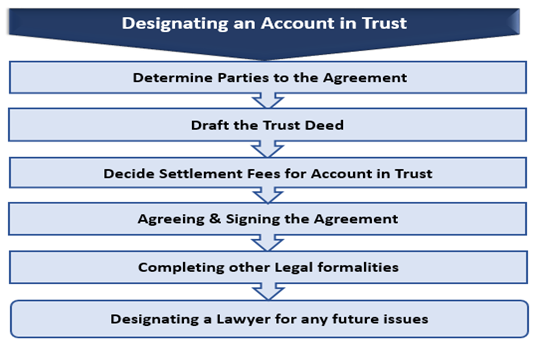What is account in trust?
Any financial account opened by an individual and managed by a designated trustee for the benefit of a third party according to agreed-upon parameters is referred to as an account in trust or trust account. It is a private legal arrangement where asset management right is transferred to a trust. The original owner is called a settlor, whereas those appointed managers are called trustees, and those eligible to receive the benefits are known as beneficiaries.
Highlights
- An account in trust is managed by a designated trustee for the owner, and a beneficiary reaps benefits of the asset.
- It is a legal agreement involving three parties, a settlor, a trustee, and a beneficiary. Parties can be individuals, companies, banks, etc.
- The agreement allows limiting powers of trustee and beneficiary, legally, which ensure effectiveness.
Frequently Asked Questions (FAQ)-
What are the steps to designate an account in trust?
To designate an account in trust, the followings steps are followed-

Source: Copyright © 2021 Kalkine Media
- Determine and identify a trustee, decide whether it’s a bank, an individual or a firm, get details like name, address, ID proofs and legal validity certifications.
- Draft and compose the trust agreement; it should be as per the settlor's requirements and the beneficiaries.
- Next is to make a settlement payment and finalise the trust deed. The trustees are allowed to charge a fee for managing the account.
- Agree to the terms and sign the trust deed. All three parties need to be okay with the terms of the agreement and formally sign the deed to make it legal and effective.
- Complete legal formalities as per applicable laws, like getting a separate bank account or registration number.
- Consulting and engaging a trusted expert lawyer for any future requirements. A legal expert is needed to handle all present and future formalities associated with the account in trust.
What are the types of accounts in trust?

Source: © Lovelyday12 | Megapixl.com
There can be various types of accounts in trust based on the nature of the account under trust, conditions of the agreements, applicable laws, etc. A few examples are given below-
- Gifts to minors- laws in most countries have provisions to allow trustees of minors to manage assets gifted to them. Here minors are the beneficiaries. Trustees are the persons managing the asset gifted, and the settlor is the provider of gifts. Access to such gifted bank account funds or properties is often given to minors by law on attaining legal age.
- Will in trust- also known as a testamentary trust account, is somebody’s testament that will be entrusted to another for managing it. The assets are legally available to beneficiaries upon the settlors’ death. The legal document creates the account in trust and determines how assets will be used after death. This is an irrevocable contract.
- Living trust- It is a trust established for using one’s assets like a property throughout life. The individual intends to pass them to a beneficiary only after death. Unlike a will in such an account in trust, the settlor shall use the asset during his lifetime.
- Escrow account - in the real estate sector, a mortgage lender often opens an account in trust. The lender utilises such an account to pay property taxes and insurance for a homeowner. The beneficiary is the government or insurance company.
What are the benefits of designating an account in trust?

Source: © Iqoncept | Megapixl.com
- A particular manner of managing and utilising the money can be decided.
- Designate a beneficiary to whom the owner wants to give the benefits.
- Limits can be set on powers of trustee and beneficiary legally. This will ensure effectiveness.
- Limits can be put to the accounts use for debt repayment and thus protect the bankruptcy of beneficiaries.
- The account in trust offers the benefits of professional management of funds with legal backing.
- Often such accounts in trust are tax exempted, or any income from them is eligible to reap tax advantages.
What are the problems in an account in trust?
Numerous Issues are linked to an account in trust; some of them are-
On gaining access to the account, the beneficiary has unrestricted access to the asset, as in the case of a gift account in trust. Funds can then be used by beneficiaries in any way and not as per the purpose of which a trustee manages it.
Example- take a bank account in trust opened by parents of an underage orphan for education, managed by their guardian. Once the child becomes an adult, they have access to the funds freedom to use the funds in any way they like and not for the real purpose, which was education.
Another issue is when assets set in the account are not allowed to be reallocated to other parties. If the appointed trustee or beneficiary passes away, the right of the account in trust is not transferrable to another deserving beneficiary or dependent.
There can be various other issues that may pop up in future depending on the way the agreement is made up.
 Please wait processing your request...
Please wait processing your request...